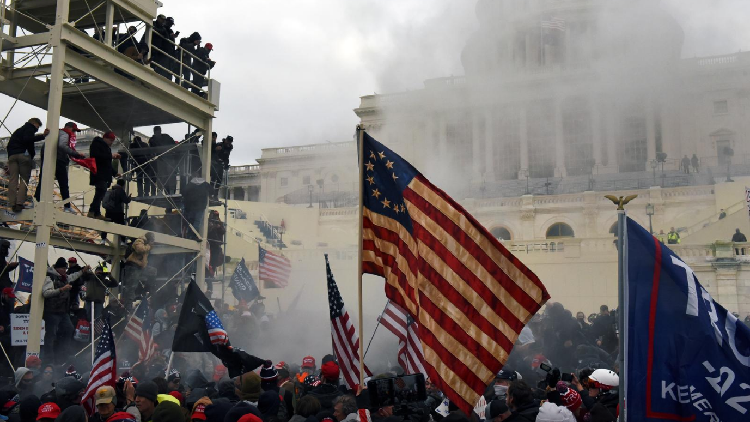
Supporters of U.S. President Donald Trump storm the U.S. Capitol building in Washington, January 6, 2021. /Reuters
Supporters of U.S. President Donald Trump storm the U.S. Capitol building in Washington, January 6, 2021. /Reuters
Editor's note: Freddie Reidy is a freelance writer based in London. He studied history and history of art at the University of Kent, Canterbury, specializing in Russian history and international politics. The article reflects the author's opinions and not necessarily the views of CGTN.
With Washington in turmoil in the aftermath of Donald Trump's supporters storming of the Capitol on January 6, there is another battleground emerging – one for the Republican Party's future.
During the hiatus between the final projection of the November election and the electoral college convening, there was an opportunity for senior Republicans to seize the reins, acknowledge defeat and begin to shape the party's future direction. However, this opportunity was missed and instead, the country was put through weeks of disputed claims and failed court proceedings amid heightening tension.
Republican reluctance to stand up to the president, or at least, acknowledge the vote, points toward a party that is suffering a toxic combination of complacency and a lack of confidence.
Complacency, as the Republican Party can exercise power and influence outside of government by voting against, filibustering and relying on friendly lobbying groups to garner support for core policy issues. The Supreme Court now also has a heavy conservative influence. There is, therefore, to the many long-serving grandees, little incentive to change.
The lack of confidence stems from an inability to find a viable candidate since George W. Bush 20 years ago. John McCain was well-regarded in Washington but he lacked dynamism. Mitt Romney represented a painfully outmoded vision of America, especially when compared to Barack Obama.
Trump was not "of the party" but rather an outsider compelled to run in lieu of a better candidate. Having come from nowhere, he swept aside, with comparative ease, the party's own indifferent favorites, Jeb Bush, Ted Cruz, Marco Rubio and John Kasich. At the end of Trump's term though, one cannot say with any confidence that the GOP bench is any stronger than it was.
"Trumpism is here to stay" is a popular refrain from pundits, but is it not the case that it only has any value while there isn't a better alternative? If Trumpism is about lending a voice to the voiceless, recognizing those passed over by globalization and "making America great again," is a figure like Trump really required to push that?

Police hold protesters at gunpoint near the House Chamber inside the U.S. Capitol in Washington, January 6, 2021. /AP
Police hold protesters at gunpoint near the House Chamber inside the U.S. Capitol in Washington, January 6, 2021. /AP
The GOP is stuck in the past, fixated by the glory days of Ronald Reagan. This fixation is causing the party to lose support with younger, urban and suburban voters, many of whom were not even born during the Reagan era when America and the world were very different places.
There is a greater focus on what it was, rather than what it could be, or even what it is, to be an American. This ideological disconnect contributes to an uncomfortable reality that the GOP has not won the popular vote in 32 years.
Efforts to reform the party have come before but met with stern resistance from hardliners. Extremes define themselves by degrees of fealty to ideology, as was the case with the rise of the Tea Party, or leader, in the case of Donald Trump.
Trumpism thrives on portraying America as under attack. Trump's speech ahead of the storming of the Capitol followed this theme, "If you don't fight like hell, you're not going to have a country anymore."
As social media channels clamped down, Sarah Huckabee Sanders tweeted that "the radical left and their big tech allies cannot marginalize, censor or silence the American people." Trump chose his beloved border wall as the location of his latest speech, warning Americans of the "waves" of "really vicious people" waiting to cross the border.
The increasingly reliance on fear points to the movement's weakness. Its ideological architects Roger Ailes, Roger Stone and Steve Bannon have all gone. The pandemic exposed the limitations of Trump's leadership and while his rhetoric may have been an effective tool with the faithful, it proved a red flag to the agnostic.
Former House Speaker John Boehner tweeted that "the party of Lincoln and Reagan is off taking a nap. The nap has become a nightmare for our nation. The GOP must awaken."
Once it has awoken though, it must go through a process of renewal. A new post-Trump framework must be built up, driven by hope not fear, inspired by what could be and not by what once was.
Republicans may now be keen to break ranks, but the damage has been done, the election lost, and denial of these realities has been compounded by losses in the Georgia and, in turn, the Senate.
Republicans must therefore summon the courage and conviction to look beyond the chanting mob and acknowledge that there is a political future which does not require a resurrection of the past or Donald Trump.
(If you want to contribute and have specific expertise, please contact us at opinions@cgtn.com.)

